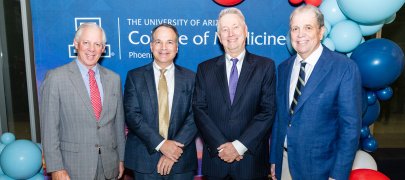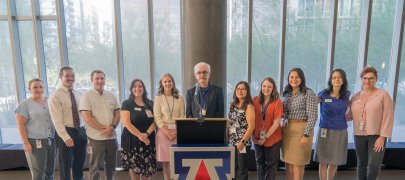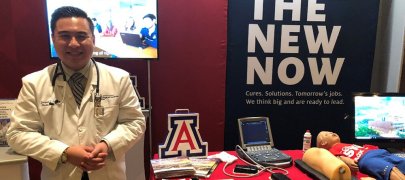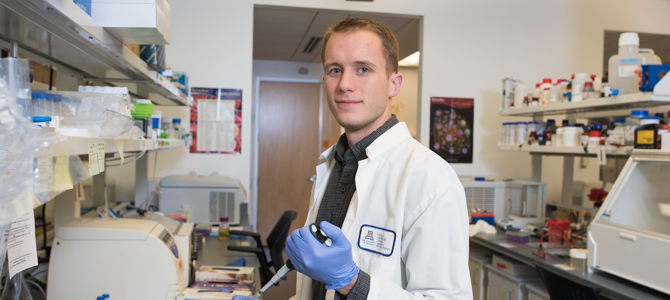
Graduate Student Finds Passion in Research

“Graduate students are critically important in moving our research mission forward by making new discoveries,” Melissa Herbst-Kralovetz, PhD, said. “They benefit us by ushering in new ideas, skills and talent to our research programs and the university.”
Jameson Gardner has been working as a graduate student researcher at the University of Arizona College of Medicine – Phoenix in the laboratory of Dr. Herbst-Kralovetz since August 2015. He is currently a PhD candidate in the Interdisciplinary Molecular and Cellular Biology Graduate Program at Arizona State University.
The laboratory of Dr. Herbst-Kralovetz researches innate mucosal immune responses to resident bacteria, pathogens and microbial products at mucosal sites, including the female reproductive tract. Her work is meant to better understand the role of genital bacterial in the biology of inflammation and type I endometrial cancer. She is an associate professor in the departments of Basic Medical Sciences and Obstetrics and Gynecology at the College of Medicine.
“I didn’t know a specific disease or topic in the field of immunology that I wanted to study when I applied to graduate school,” Gardner said. “But when I found out that genital herpes impacts more than 250 million women worldwide, I became interested in the translational impact of research in the topic and the potential it has to improve women’s health.”
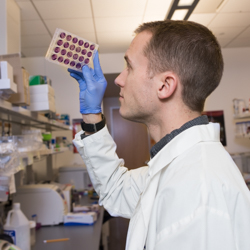 Dr. Herbst-Kralovetz said Gardner is a bright, young researcher and talented communicator who has received numerous awards for his oral presentations.
Dr. Herbst-Kralovetz said Gardner is a bright, young researcher and talented communicator who has received numerous awards for his oral presentations.
“I applied for the Interdisciplinary Molecular and Cellular Biology Graduate Program and as part of the interview process, I was invited to interview with Dr. Herbst-Kralovetz,” Gardner said. “I was very interested in her innovative research in women’s health and quickly formed a strong mentoring relationship that has greatly benefited me throughout my first years as a graduate student.”
Gardner’s current research is investigating the function of a recently identified cytokine, called IL-36gamma, in genital HSV-2 infections.
“We believe that IL-36gamma is an important regulator of inflammation in the female reproductive tract and a key component in controlling infection,” he said. “I am also researching how sex hormones and hormonal contraceptives can impact IL-36g and the vaginal epithelium to influence vulnerability to genital HSV-2 infection.”
During Gardner’s first year as a graduate student, he was awarded the “Best Oral Presentation” at a local conference. He was also awarded a Graduate Student Travel Award in 2017 from the University of Arizona College of Medicine – Phoenix Department of Basic Medical Sciences that helped him attend the International Congress on Mucosal Immunology in Washington D.C. last summer.
“For those interested in graduate school, I think the first thing is to gain experience by working in a research lab and learning how research is performed,” Gardner said. “Though it was unrelated to what I am researching now, many of the skills and techniques that I learned from volunteering in a lab as an undergraduate allowed me to jump in as a graduate student and be a productive researcher from the start.”
Gardner added, “I would also say you need to find what you are passionate about. What are you thinking about when you aren’t at work or researching? What are you ‘geeked up’ about? Research has so many ups and downs, and working on something you love makes the high points even better and helps you work through the lows quickly.”
Gardner was the recent recipient of the Harry Lowell Swift Advancing Health Scholarship in the College of Liberal Arts and Sciences at Arizona State University.
“I am honored and grateful for the recognition I have received for my research and the potential it has to increase our understanding of the immune response to genital HSV-2 infections and women’s health,” Gardner said. “I see this scholarship as validation for the work I have done so far, and motivation as I continue my research and graduate studies.”
About the College
Founded in 2007, the University of Arizona College of Medicine – Phoenix inspires and trains exemplary physicians, scientists and leaders to optimize health and health care in Arizona and beyond. By cultivating collaborative research locally and globally, the college accelerates discovery in a number of critical areas — including cancer, stroke, traumatic brain injury and cardiovascular disease. Championed as a student-centric campus, the college has graduated more than 800 physicians, all of whom received exceptional training from nine clinical partners and more than 2,700 diverse faculty members. As the anchor to the Phoenix Bioscience Core, which is projected to have an economic impact of $3.1 billion by 2025, the college prides itself on engaging with the community, fostering education, inclusion, access and advocacy.
